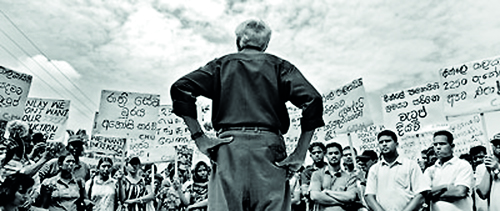What happened to Rajapaksa’s 1995 Workers Charter, asks Bala Tampoe
The rights of workers have deteriorated to such an extent that it is now a violation of human rights equivalent to crimes against humanity, and this accusation came from no less a person than Bala Tampoe, Sri Lanka’s iconic and most venerated trade unionist who recently celebrated his 92nd birthday.
Mr. Tampoe, still the General Secretary of Ceylon Mercantile Union who was seen sturdily riding on the pillion of a motor cycle to attend a May Day rally, was one of the panellists at a workshop on “How Rational is Sri Lanka’s National Policy on Wages” organised by the Sri Lanka Economic Association (SLEA) and held late last month at the OPA auditorium in Colombo.

Standing tall: Bala Tampoe at a CMU protest rally (File photo).
The workshop was focusing on the recently set-up National Pay Commission appointed by President Mahinda Rajapaksa somewhat similar to that of the National Workers Charter (NWC) introduced by Rajapaksa in 1995 when he was the Minister of Labour. However Mr. Tampoe while stressing that National Workers Charter should be implemented before any other commission for workers in this country, was successful in drawing attention of the Forum to this serious indictment of violating the fundamental rights of the workers.
Referring to such rights, he said “No less a person than Pope Francis referring to a recent tragedy in garment factories in Bangladesh has said that the conditions there are those of slavery.” He said that Ms. Navi Pillai, UN Rapporteur on Human Rights in her recent May Day declaration indicated that the garment sector in countries including India and Bangladesh should be viewed by the Geneva-based Human Rights Commission.
Today the real issue for workers in countries like Sri Lanka, India, Bangladesh and a greater part of Asia other than the industrial countries and richer states like Australia, New Zealand or Japan,is not labour rights , not worker rights, but their rights as humans.
“While the UNHRC is asked to look at the question of war crimes in this country, my position is that the people of this country have to look at ‘what I would call’ crimes against humanity that operates against the workers in this country,” he said.
Referring to the National Pay Commission (NPC), he said that unions have no hopes of a positive outcome from this body.
He said that President Rajapaksa himself has to explain what happened to the 1995 charter that he had introduced. He said that this NWC was promulgated on September 2 1995 with a mandate from a Parliamentary Election and a Presidential Election. The NWC should take into account the relevant ILO conventions that are ratified by Sri Lanka Government.
Further, he said, the NWC ensures protection of workers’ rights and equal rights among other issues.
He said the Government is committed to ratify the conventions of the International Labour Organisation in terms of labour rights, right to organise, rights of women, protection of children, preventing child labour and child abuse, etc.
He said that though the NWC is a document accepted by all the workers of this country, the Employers Federation of Ceylon (EFC) has indicated that this charter is completely out of date and inconsistent with the ‘Mahinda Chinthana’.
While the private sector in this country is the major sector of the country’s economy, the largest number of trade unions registered is from the state sector. Out of the 2,000-odd registered, around 90 per cent are from state sector.
In the private sector, he said there are only a very few meaningful trade unions with some big companies coming under EFC not having trade unions.
Prof. A.D.V. de S. Indraratne, SLEA President, opening the discussion, said that since independence there have been talks on a National Wage Policy for Sri Lanka, but as in the case of all other national policies, no significant progress has been made to implement such s policy.
Other speakers at the Forum were: Neville Piyadigama, Co-Chairman, National Pay Commission; Prof. Sunil Chandrasiri, Dean, Faculty of Graduate Studies, University of Colombo; Prof. Athula Ranasinghe, Dean, Faculty of Arts, University of Colombo and Kanishka Weerasinghe, Deputy Director General, Ceylon Employers Federation.


